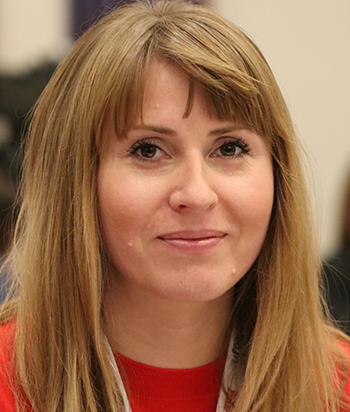Participants from around the world gathered for the United Nations 65th Conference on The Status of Women, taking part in numerous sessions, with a great number looking at the impact of COVID-19 on women, youth and women of colour. Much attention has been given to the experiences of women in the public sector given large numbers of women in sectors like education and healthcare, but the experiences of women in the private sector hasn’t been in the spotlight, despite many workers in this sector being on the frontlines.
As part of a panel, “Done Waiting: Making Gains towards Economic Justice”, Ivana Saula, Research Director for Canada was invited to participate and share stories of women’s experiences in the private sector. “There’s certainly an interest in experiences of women in a domain where women are in the minority. Most participants and attendees were surprised that airport workers, which the IAM represents in large numbers, continued to work during the pandemic, and were on a different kind of frontline, without protections and pandemic pay other frontline workers received. So, the discussion generated a lot of interest,” said Saula.
Balancing work and family responsibilities, managing children’s online learning, looking after elderly or sick family members, and at times, making the difficult choice to leave employment either temporarily or permanently, are issues common to women across sectors, and even countries. These gaps, and disproportional burdens placed on women due to social structures, programs and policies that fail to acknowledge and support unpaid work, have set women back during the pandemic. While women’s employment declined, men’s employment increased. These issues are not unique to any sector, they are systemic.
“Private sector workers in some cases did not receive pandemic pay, despite working on the frontlines, so one of the best protections, is a collective bargaining agreement. While it was important to address how collective agreements protect workers, if we’re looking at the situation from the perspective of women, young workers, and workers of colour, we also have to acknowledge the gaps,” said Saula. In the private sector where women, young workers, immigrants, and workers of colour are fairly new additions, despite the pillar of collective agreements, seniority can work against those workers. Workers with low seniority are more susceptible to a lay-off, but also wait longer to be recalled back to work. A lay-off almost always results in benefits being discontinued, which during a pandemic are critical.
On the other hand, women whose seniority protected them from a lay-off, were more likely to take an unpaid leave to look after their families during the pandemic, leaving them without benefits, and a break in pensionable service.
“It was a great panel to be on, not only because it was an opportunity to bring stories of our members to a global audience, but it was also an opportunity to recognize how common our challenges are and how important unity is in addressing systemic issues that disadvantage women,” commented Saula.
Common challenges were noted, with childcare being at the top of the list. There was also recognition that as members of civil society we must continue to ensure equal pay for equal work and that equal pay for work of equal value is respected in the workplaces – along with other protections. Perhaps most importantly, it is critical that women, young workers, workers of colour not only have a seat at the table, but that their voices are not silenced, but heard and valued.
Ivana Saula, IAM Canadian Research Director


